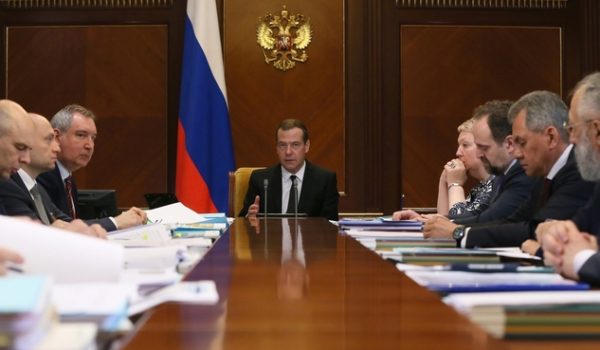Meeting on the development of Russia’s Arctic zone chaired by Russian Prime Minister Dmitry Medvedev

Opening remarks by Dmitry Medvedev:
We have gathered to discuss issues concerning the development of the Russian Arctic. The President and some of our other colleagues who are present here recently took a trip to Franz Josef Land. There we discussed the results of work to eliminate environmental damage to the islands. But environmental problems aren’t the only ones that need to be solved in the Arctic. We had a meeting there at which special attention was devoted to the economic component. We agreed to hold a detailed discussion on a number of issues at a government meeting, so today we will have a substantive talk about the economic development of the Russian Arctic.
I won’t speak specifically about the uniqueness of this region since this has already been repeatedly addressed at different levels. I will only say that we are consistently continuing to expand the Russian presence in the Arctic, stepping up the industrial development of the Arctic shelf and new deposits of strategic metals and other minerals, building social and transport infrastructure, continuing to develop the Northern Sea Route – the shortest water route between European and Asian ports, and also working on protecting other Russian interests.
But we still have a lot of work to do, which requires clear coordinated efforts from the government, the Arctic regions themselves, as well as business. I will remind you once again that in 2014 the Government approved a state programme for the socioeconomic development of the Arctic zone for the period until 2020. As we discussed in Franz Josef Land, this document currently has an analytical nature. It’s a summary of parts of industry-based state programmes that concern the Arctic. It’s obviously not enough. This document simply designates areas for development without any actual funding, which, of course, largely devalues such efforts.
The Ministry of Economic Development has prepared an updated version of the state programme, which should also contain specific objectives and, most importantly, tools that ensure their unconditional fulfilment, including financially. This is precisely what we agreed on, and today we will discuss this draft. In this sense, the main goal is for us to understand what we have.
Naturally, we need to look at various issues concerning the development of the Arctic zone in terms of transport, science, the environment, tourism, and the construction of infrastructure, including opportunities to utilize dual purpose infrastructure. More than half of the entire world’s Arctic population resides here – almost 2.5 million people in that zone.
We will discuss what the line ministries are proposing to unlock potential in each of these areas. And then we will move on to the practical implementation of the proposals that will be made today as part of a new version of the state programme as well as other tools if we reach an agreement on them today and if they can be utilized.
We also have a state commission that naturally should also be involved in this going forward.

